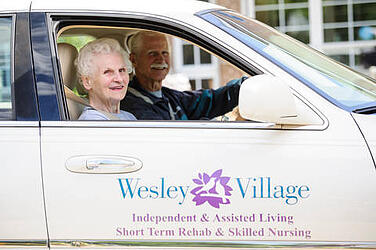 Just because driving abilities change with age doesn’t mean it's time to take away your aging loved one's car keys. While driver safety can be a sensitive subject for seniors, you can help reduce risk factors and promote better driving through these nine safety tips.
Just because driving abilities change with age doesn’t mean it's time to take away your aging loved one's car keys. While driver safety can be a sensitive subject for seniors, you can help reduce risk factors and promote better driving through these nine safety tips.
1. Assess Conditions
Encourage your aging loved one to drive only when conditions are safest. For many seniors, this means restricting driving to daylight hours and fair weather. Older drivers should also log less miles than younger drivers.
2. Build Strength and Flexibility
Many seniors suffer from a lack of flexibility, weak muscles, and restricted range of motion, all of which can detrimentally affect driving abilities. Encourage your aging loved one to exercise regularly to increase agility and strength.
3. Manage Medications
More than 75 percent of senior drivers take at least one medication, but only a third are aware of the potentially adverse effects on driving performance. Ask your aging parent’s physician to review all prescription and over the counter meds for driving safety.
4. Check In and Check Up
As sharp senses are essential to driving safety, your aging loved one’s eyesight and hearing should be checked at least once a year. Reinforce the importance of using corrective lenses and hearing aids when behind the wheel. If your loved one has physical limitations, consult with an occupational therapist who can share adaptive tips and techniques for operating a vehicle.
5. Map It Out
Struggling to find a destination while driving is challenging under the best circumstances, but can be particularly overwhelming for seniors. Set your loved one up for success by planning and reviewing together the safest, simplest route of travel.
6. Minimize Distractions
Loud radios, cell phones, and GPS technology can be distracting. Encourage a quiet setting for optimal driving. And remember: you can’t prevent other drivers from becoming distracted, so encourage defensive driving, such as paying careful attention at intersections and allowing sufficient braking distance.
7. Sleep Matters
Cognitive abilities may be impaired by age, but lack of sleep further exacerbates the issue. Make sure your aging loved one is getting a good night’s sleep. If he/she takes sleep medication, consult with a healthcare practitioner about its impact on driving abilities.
8. Car Talk
The right car can help keep your aging loved one behind the wheel longer. Vehicles with power steering and brakes and automatic transmission are easiest to operate. Turn up the brightness on the instrument panel to maximize visibility, and make sure windshields, mirrors and headlights are clean and clear of debris.
9. Create Options
The more transportation options seniors have, the less likely they are to get behind the wheel in compromising situations. Look into public transportation, senior shuttles and carpooling so your loved one has plenty of choices when driving isn't ideal. This can also help ease the transition when it’s time to hand over the keys.
Key Takeaways
- Driving helps older adults stay mobile and independent, but safe driving for seniors requires some extra effort.
- As fatal crash rates skyrocket for drivers over 70, it’s particularly important to encourage safe driving among the elderly.
- A physician is a valuable partner in assessing your aging loved one’s driving capabilities.
- If and when the time comes for your loved one to stop driving, be firm, but respectful: safety is the top priority.

